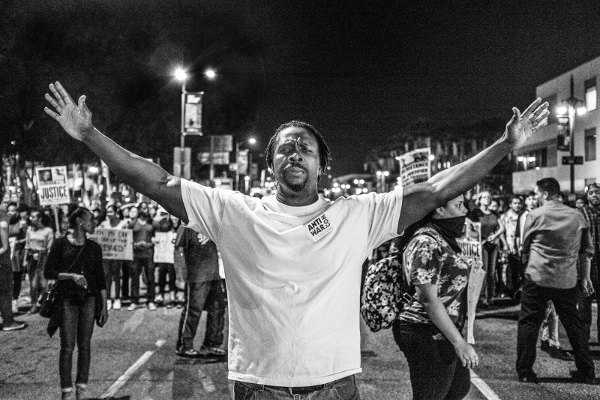
PHOTO/JOHN HWANG
By Suzette Shaw, Skid Row resident, Poet, Feminist Activist
LOS ANGELES, CA — As a member of LA CAN (Community Action Network), an organization which advocates for the homeless and poor, based in LA’s Skid Row, I am witnessing the birth of today’s civil rights movement.
Over the Thanksgiving holiday I watched “Pastor Cue” Jn-Marie lead a crowd through downtown Los Angeles to protest the police killings—most often of Black men— throughout the nation. Here in Los Angeles, Ezell Ford, a mentally disabled man, was killed. Pastor Cue, the lead pastor and founder of “The Church Without Walls,” a Friday night ministry in Skid Row, is also a member of CLUE LA (Clergy and Laity United for Economic Justice) and an organizer for SCLC—the Christian Leadership Conference— which Dr. King was president of at the time of his murder.
Los Angeles has living connections to the Civil Rights Movement led by Dr. Martin Luther King, Jr. I learned this myself when leaving the theatre after seeing “Selma,” the new film that chronicles the months of struggle leading up to the passage of the Voting Rights Act of 1965. I found the movie to be thought provoking, yet inspiring. As we departed the theatre, an elderly Black lady announced, “I’m from Alabama, I have friends who use to march with Dr. King.” We got in touch, and one week later, I am sitting at the residence of Joyce Orange and her husband, Nathaniel.
A young Black teen raised during the mid-1900s in the heart of the Jim Crow South: Birmingham, Alabama. Joyce Orange Nelson says, “We didn’t know we were getting involved in a movement. We just wanted to be able to sit at the counters to eat, ride the bus and try on clothes in the department stores.” (Blacks then were not allowed to go into fitting rooms in department stores.) She was approximately 14 years of age when she joined the movement. She was arrested multiple times, once with Dr. King himself bailing her out, along with her father. Mrs. Nelson’s brother, Reverend James Orange, was Dr. King’s personal aide, present at Lorraine Hotel when Dr. King was murdered.
Nathaniel Nelson made an interesting comment as I sat with them at their residence, “It should have never been a civil rights bill,” Mr. Nelson proclaims, “It should have been an equal rights bill. With civil rights they felt they were giving up something to give to us, which should have been equally ours as American citizens.”
I find this point fascinating, given here we are today, still fighting for “equal rights.” Ironically, the current civil rights movement appears to be dealing with many of the disparaging issues which plagued our forefathers and mothers of the past movement; voting rights (check California Prop 47), wage gaps, self-sustainable employment, access to housing and fair treatment overall—but in a new environment of economic crisis, job loss, and displacement of the 99% as a whole. As Dr. King’s character says in the movie “Selma,” “It doesn’t do much to sit at the lunch counter if you can’t afford a hamburger.”
